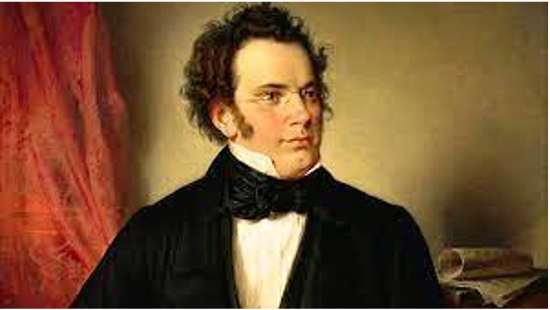


Austrian composer, pianist, violinist and teacher who produced a spectacular number of musical masterpieces (mostly songs and short piano pieces) despite his early death at 31. His work rate was unprecedented: only in 1815, he wrote 140 pieces (including 8 in just 1 day). Described by Liszt as “the most poetic of composers”, Schubert composed some of the most memorable music pieces, such as the "4 Impromptus, Op.90, D899", "Piano Trio No.2 in E Flat Major, Op.100, D929", "Piano Sonata No.21 in B Flat Major, D960", and "Winterreise 911".
He was the son of a Viennese school master who taught his son the basics in music and cultivated his love of music. His talent was then spotted by the composer Salieri (the wrongly presumed Mozart's murderer) who encouraged his family to enrol him in a boarding music school and taught him musical theory.
Initially Schubert became a teacher and by the time he was 20, he started composing. Around that time, his music started becoming famous in Vienna. Concert parties called Schubertiaden flourished around the city. Beethoven is said to have looked into some of the younger man’s works and exclaimed, “Truly, the spark of divine genius resides in this Schubert!" However, it was only after Schubert's death that his musical genius received the wide international recognition that it deserved.
Schubert was an introvert and shy person and suffered from mood swings. In his mid 20s, he contracted syphilis and became seriously ill. Despite this, he stayed committed to his music and continued to produce impressive work, in both quantity and quality. However, especially during the last years of his life, as he was staring death in the face, his music bears some melancholy. "Cheerful music? I don't know any cheerful music!" he wrote once. And another time he wrote, "I am the most unhappy and miserable person in this world… my health will never improve, and in such despair, things will only become worse instead of better…”.
Schubert left behind him legendary melodies and beautiful harmonies. As the famous pianist Andràs Schiff confirms "There are really those goose bumps with Schubert". For Schiff, Schubert's music is a mystery: death and life, lovely and gloomy moods are so closely intertwined. His music is actually like songs without words. And although Schubert's compositions do not have the technical development and virtuosic style of other composers' music, his emotional expression through his music is extremely developed. Today, he is one of the most frequently performed composers of the early 19th century.
"Angel's fantasy"
(Fantaisie in F Minor)

"Declaring"
(Impromptu Op. 90 No 1)

"Trying to escape"
(Impromptu Op. 90 No 2)

"Praying"
(Impromptu Op. 90 No 3)

"Accepting"
(Impromptu Op. 90 No 4)

"On the threshold of death"
(Piano Sonata D960)

"Three poems in sound"
(Three Piano Pieces D 946 in E Flat)

"Ave Maria / Ellens Gesang III"

"Enticing Schubert tango"
(Piano Trio No 2 in E Flat Major, Op 100, D929)

"Elf king"
(or "Erlkönig")
